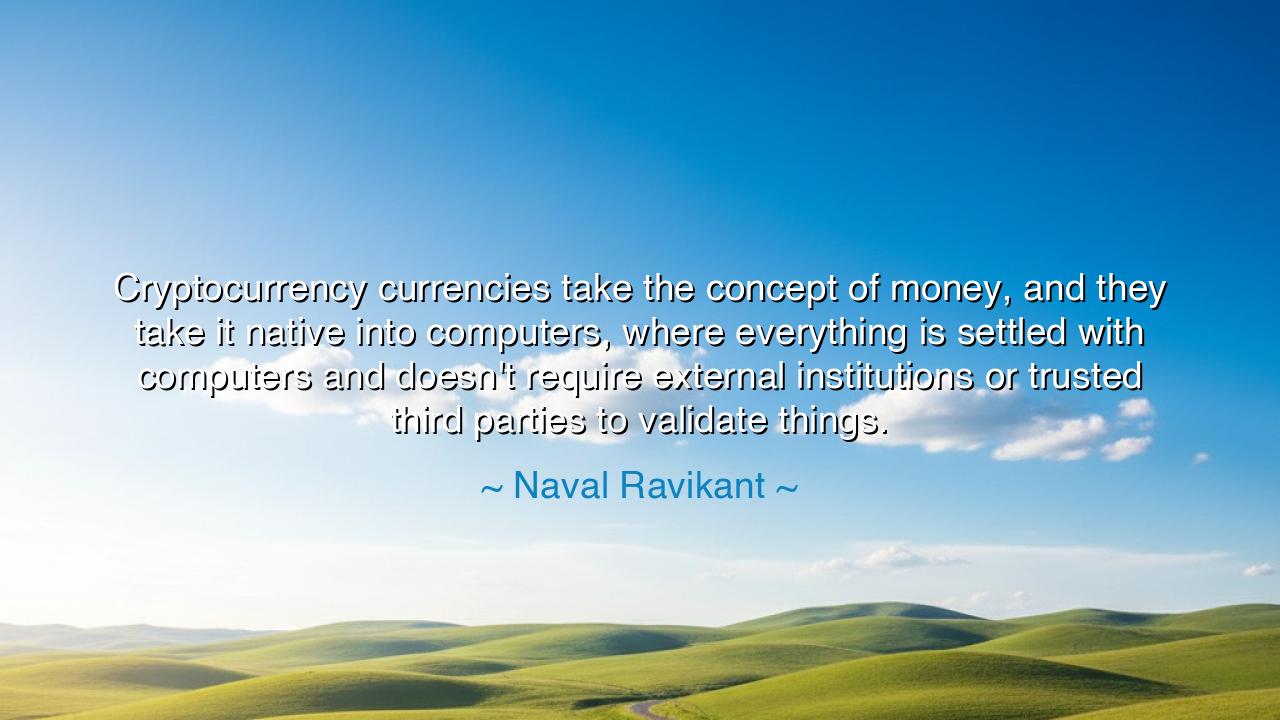
Cryptocurrency currencies take the concept of money, and they
Cryptocurrency currencies take the concept of money, and they take it native into computers, where everything is settled with computers and doesn't require external institutions or trusted third parties to validate things.






"Cryptocurrency currencies take the concept of money, and they take it native into computers, where everything is settled with computers and doesn't require external institutions or trusted third parties to validate things." These words spoken by Naval Ravikant capture the revolutionary essence of cryptocurrency and its challenge to the traditional financial systems. Ravikant's reflection reveals how cryptocurrencies fundamentally shift the concept of money from being something governed by external, often centralized, authorities—such as banks, governments, or institutions—to a decentralized digital realm where computers themselves become the arbiters of transactions. In essence, it is a shift from trusting external institutions to trusting the very mathematics and code behind these systems.
In the ancient world, the concept of money was closely tied to society’s trust in external structures. The earliest forms of currency were not just physical objects, but symbols of mutual trust. Whether it was metal coins, promissory notes, or barter systems, the essence of money rested on the idea that both parties in a transaction would adhere to an agreement, often enforced by the authority of kings, merchants, or other central figures. For instance, in Rome, the emperor’s seal on a coin signified its legitimacy, and the Roman Empire ensured that this system remained intact through military and administrative force. This was a world where external institutions validated the exchange of goods, services, and wealth, and trust was embedded in the very structure of society.
Consider the example of ancient Mesopotamia, where the first forms of writing emerged alongside the development of money. In the form of clay tablets, early records of debts and transactions were kept, often under the supervision of priests or scribes. These institutions held authority over the value of trade, and the economic system was based on external validation and accountability. Yet, this trust was subject to the same weaknesses we face today: corruption, inefficiency, and central control. The shift towards cryptocurrency is a reflection of the ancient desire for a system of exchange that does not rely on human institutions but instead places trust in math and code, much like the shift from tribal barter to coinage in the past, but now on a global and digital scale.
In the modern world, cryptocurrencies like Bitcoin and Ethereum challenge the centralized nature of our financial systems. The blockchain technology underlying these digital currencies allows transactions to be validated not by a central authority but by a decentralized network of computers. Each transaction is recorded on a digital ledger that is maintained by numerous participants, ensuring transparency and security without the need for a traditional bank or government to validate it. This mirrors the ancient shift when humanity first discovered the power of currency to transcend barter, offering a universal medium of exchange, yet with an added layer of security and trust built not on human institutions, but on cryptography and algorithms.
Think of the story of Lydia, the ancient kingdom where the first coins were minted. These coins were a revolutionary development, enabling trade to flourish not just within the local community, but across vast empires. Lydia's innovation in coinage allowed for a standardized form of money that could be trusted across various cultures and borders, much like the role cryptocurrency is poised to play today in the digital age. Just as Lydia’s coins marked a new era in economic exchange, cryptocurrencies represent a digital revolution that challenges the current financial paradigm and empowers individuals by giving them direct control over their wealth and transactions.
However, with this great power comes the potential for uncertainty and chaos. In the same way that the early use of coinage was met with skepticism and the eventual rise of counterfeit coins, cryptocurrencies have encountered challenges of their own. The volatile nature of digital currencies, the risk of cyber-attacks, and the regulatory uncertainty surrounding them are hurdles that must be addressed before they can fully realize their potential. Yet, the promise of a decentralized, trustless system is undeniable. It gives rise to a future where financial systems are not beholden to governments or banks but are instead driven by the collective actions of the participants in the network.
The lesson from Ravikant’s quote is one of empowerment and freedom. Just as the ancient world moved from barter to currency, and then from physical currency to the digital era, we are now on the cusp of another great shift—one where control over money is taken out of the hands of centralized institutions and placed into the hands of the people. The challenge lies not in rejecting this new system, but in understanding it, embracing its potential, and navigating its complexities. In the ancient world, progress was often about finding new tools to facilitate human connection and trade. Today, the tools are digital, and we must learn how to wield them wisely.
In practical terms, this means that we must educate ourselves about the technologies behind cryptocurrencies and the blockchain. We must understand the implications of decentralized systems and how they can be used to empower individuals, protect privacy, and secure financial freedom. Just as the ancient traders had to adapt to the use of coins in their dealings, so must we learn to adapt to this new form of money. The future of finance is no longer tied to the institutions that have long held control but is moving into the hands of the individual. Let us rise to meet this challenge with wisdom, caution, and an understanding of the powerful tools at our disposal. The age of decentralization is here, and with it comes a new opportunity for personal and collective empowerment.






AAdministratorAdministrator
Welcome, honored guests. Please leave a comment, we will respond soon